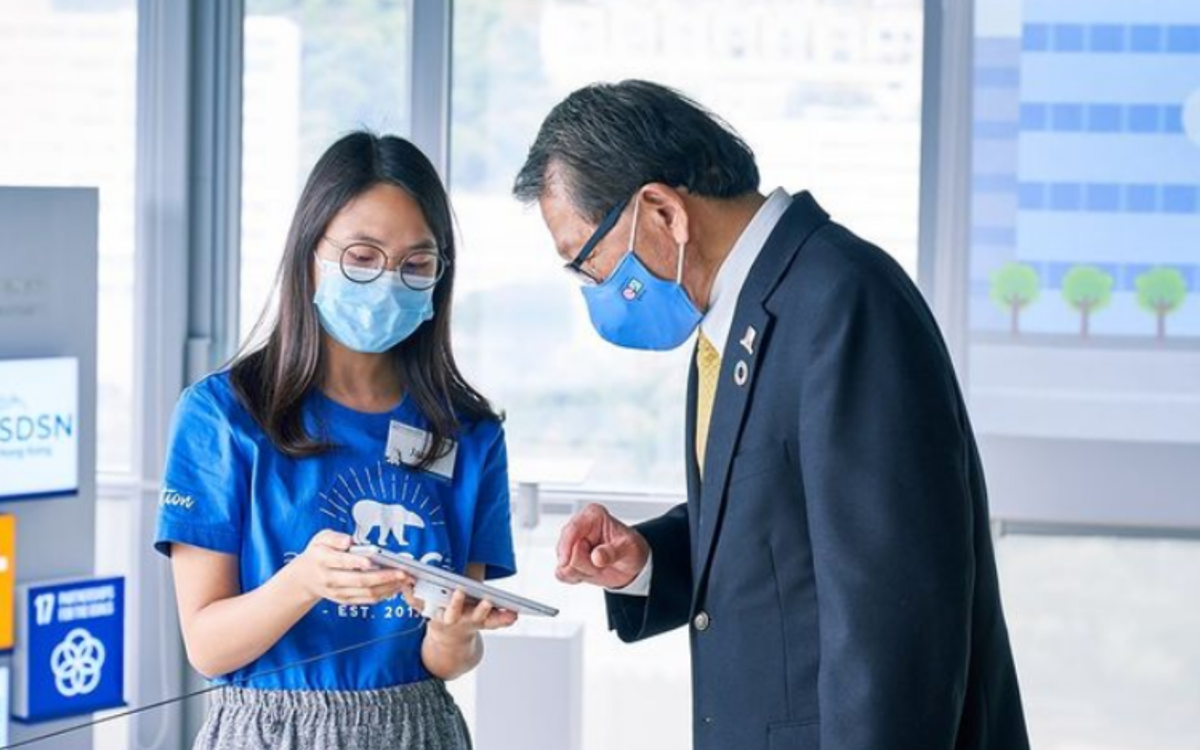The Chinese University of Hong Kong.

Museums educate people and people change the world. In December 2013, ACU member The Chinese University of Hong Kong (CUHK) established the Jockey Club Museum of Climate Change (MoCC) with funding from The Hong Kong Jockey Club Charities Trust to promote knowledge about climate change.
The museum responds to the pressing need to make climate education accessible to wider audiences. While the global climate crisis dominates today’s media headlines, education and museums are critical spaces where awareness can truly thrive.
As the first museum of its kind in the world, the MoCC serves as CUHK’s flagship community outreach initiative to advocate for sustainability education. Through a host of projects, the MoCC aims to encourage and enable Hong Kong people of all ages and walks of life to get involved in carbon-reducing action, live a green lifestyle and encourage climate-friendly behaviour within the community.
The MoCC draws on voices from different sectors, continents, and disciplines to offer interactive, multimedia exhibitions that showcase valuable collections and information about climate change.
A recent example is the Decade of Change exhibition arranged in collaboration with the UK-based digital media organization 1854 Media and the British Journal of Photography. The photographic exhibition documents the defining challenge of our humanity at present: the climate crisis.
In addition to running exhibitions, the museum also provides a variety of environmental education activities, including environment fairs, eco-tours, and sustainability workshops and talks.
Nurturing future sustainability leaders
Making climate education accessible to all and driving positive societal change is at the heart of the museum. The MoCC welcomes a range of visitors—having hit the 1 million visitors milestone in March 2021—ranging from professors, kindergarten teachers, retirees, and pre-school children.
The MoCC is likely to be the first contact that children have with the concept of climate change – making it a unique contribution to the delivery of climate education and research to the wider public. By providing a physical space for climate education where students account for 50–60% of physical visitors, the MoCC is an investment in supporting the next generation of sustainability leaders. According to CUHK, early intervention is key part of this.
Environmental education for young children and experiential learning are essential. We encourage other museums, schools and cultural institutions to replicate our model of education and engagement to support people to respond to and act on climate threats’

Beyond hosting exhibitions, the MoCC also recruits student ambassadors and trains young green leaders to advocate for climate action in Hong Kong. Year-long training and internships for undergraduate and graduate students from different disciplines provide student ambassadors with intensive training in climate change and museum operations before contributing to a range of museum services and events. By positioning students as not only consumers of knowledge but as proactive agents of change—through sharing learning, guiding tours and leading workshops—the Ambassadorship unlocks leadership skills and nurtures future sustainability leaders.
A recent longitudinal study tracking the changes in knowledge, attitudes and behaviour of the student ambassadors suggests that 80% of the interviewees show signs of knowledge improvement, while 93% are committed to adopting a low-carbon lifestyle, and 80% have demonstrated improved solutions-seeking initiative or actual behavioural changes after completing a full-year ambassadorship.
Cultivating lasting relationships and impact
Crucially, the museum sustains lasting impact through the connections made possible by the Ambassadorship. MoCC Ambassadors remain connected with the museum even after graduation, with many returning to support the museum in ambassador training and some, now as teachers, encouraging their students to participate in the museum’s educational programmes.
Other post-graduate researchers in renowned institutes such as University of Oxford and Swedish University of Agricultural Sciences, collaborate with the museum on exhibition and tour curation and delivery, sharing their newly acquired knowledge and the perspective of a budding researcher with the community.
‘Through these connections and collaborations, the MoCC knows that climate action is taking place and being passed on to others’, Cecilia reflects.
Universities and museums are uniquely placed to educate young people and the general public about the impact of climate change. By creating an accessible resource for this learning, the MoCC will continue playing a creative role in moulding a future generation of leaders to act as a catalyst for positive change.
More information
Beyond the MoCC, CUHK works across borders and disciplines to address the climate crisis through a myriad of other projects, such as:
- The CUHK–University of Exeter Joint Centre for Environmental Sustainability and Resilience, the first of its kind in Hong Kong, has delivered high-impact breakthroughs in climate research, particularly in tackling emerging issues related to the changing environment and their effects on human health and wellbeing.
- The multi-disciplinary Institute of Future Cities conducts research on urban climatic studies and their applications in climate-sensitive urban planning and design, fostering sustainable cities and communities and supporting effective climate action in urban areas.
- The State Key Laboratory of Agrobiotechnology (CUHK) has made ground-breaking achievements including applying state-of-the-art genomics technologies to the cultivation of high-yield, high-quality and high-tolerance soybeans, the most eco-friendly food staple, to address food security and planetary health concerns.
CUHK also proudly co-host the Hong Kong Chapter of the United Nations’ Sustainable Development Solutions Network, exemplifying their commitment to bringing the SDGs to life.
